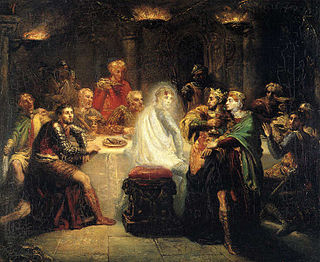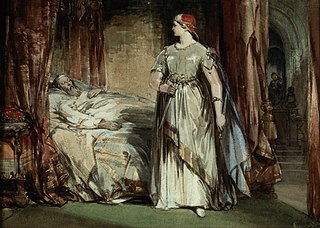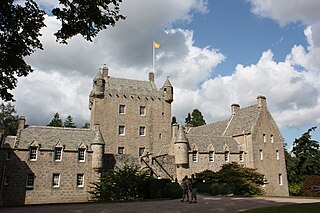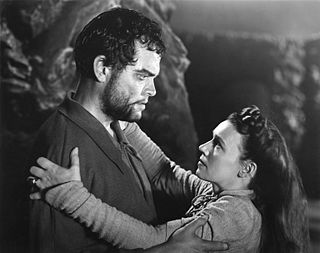
Lord Banquo, the Thane of Lochaber, is a character in William Shakespeare's 1606 play Macbeth. In the play, he is at first an ally to Macbeth and they meet the Three Witches together. After prophesising that Macbeth will become king, the witches tell Banquo that he will not be king himself, but that his descendants will be. Later, Macbeth in his lust for power sees Banquo as a threat and has him murdered by two hired assassins; Banquo's son, Fleance, escapes. Banquo's ghost returns in a later scene, causing Macbeth to react with alarm during a public feast.

Macbeth is a tragedy by William Shakespeare; it is thought to have been first performed in 1606. It dramatises the damaging physical and psychological effects of political ambition on those who seek power for its own sake. Of all the plays that Shakespeare wrote during the reign of James I, who was patron of Shakespeare's acting company, Macbeth most clearly reflects the playwright's relationship with his sovereign. It was first published in the Folio of 1623, possibly from a prompt book, and is Shakespeare's shortest tragedy.
Macbeth was King of Scots from 1040 until his death. He was titled King of Alba during his life, and ruled over only a portion of present-day Scotland.
Malcolm III was King of Scots from 1058 to 1093. He was later nicknamed "Canmore". Malcolm's long reign of 35 years preceded the beginning of the Scoto-Norman age. Henry I of England and Eustace III of Boulogne were his sons-in-law, making him the maternal grandfather of Empress Matilda, William Adelin and Matilda of Boulogne. All three of them were prominent in English politics during the 12th century.
Donald III, and nicknamed "Donald the Fair" or "Donald the White", was King of Scots from 1093–1094 and 1094–1097.
Cináed mac Duib anglicised as Kenneth III, and nicknamed An Donn, "the Chief" or "the Brown", was King of Scots from 997 to 1005. He was the son of Dub. Many of the Scots sources refer to him as Giric son of Kenneth son of Dub, which is taken to be an error. An alternate explanation is that Kenneth had a son, Giric, who ruled jointly with his father

Lord Macduff, the Thane of Fife, is a character in William Shakespeare's Macbeth (c.1603–1607). Macduff plays a pivotal role in the play: he suspects Macbeth of regicide and eventually kills Macbeth in the final act. He can be seen as the avenging hero who helps save Scotland from Macbeth's tyranny in the play.
Gruoch ingen Boite was a Scottish queen, the daughter of Boite mac Cináeda, son of Cináed III. She is most famous for being the wife and queen of MacBethad mac Findlaích (Macbeth). The dates of her life are not certainly known.

Lady Macbeth is a leading character in William Shakespeare's tragedy Macbeth (c.1603–1607). The wife of the play's tragic hero, Macbeth, Lady Macbeth goads her husband into committing regicide, after which she becomes queen of Scotland. Later, however, she suffers pangs of guilt for her part in the crime, which drives her to sleepwalk. She dies off-stage in the last act, an apparent suicide.
Fleance is a figure in legendary Scottish history. He was depicted by 16th-century historians as the son of Lord Banquo, Thane of Lochaber, and the ancestor of the kings of the House of Stuart. Fleance is best known as a character in William Shakespeare's play Macbeth, in which the Three Witches prophesy that Banquo's descendants shall be kings. Some screen adaptations of the story expand on Fleance's role by showing his return to the kingdom after Macbeth's death.

Cawdor Castle is set amid gardens in the parish of Cawdor in Nairnshire, Scotland. The castle is built around a 15th-century tower house, with substantial additions in later centuries. Originally a property of the Calder family, it passed to the Campbells in the 16th century. It remains in Campbell ownership, and is now home to the Dowager Countess Cawdor, stepmother of Colin Campbell, 7th Earl Cawdor.

Lord Macbeth, the Thane of Glamis, is the title character and titular main protagonist turned primary antagonist of William Shakespeare's Macbeth. The character is based on the historical king Macbeth of Scotland, and is derived largely from the account in Holinshed's Chronicles (1587), a history of Britain.
Duncan is a given name. It is an Anglicised form of the Gaelic Donnchadh. The final letter n in the Anglicised Duncan seems to be a result of confusion in the Latin form of the name—Duncanus—with the Gaelic word ceann, meaning "head". One opinion is that the Gaelic Donnchadh is composed of the elements donn, meaning "dark or dark-haired man" or "chieftain"; and cath, meaning "battle", together meaning "dark-haired or dark warrior". Another opinion is that the Gaelic Donnchadh is composed of the elements donn, meaning "brown"; and chadh, meaning "chief" or "noble".

Holinshed's Chronicles, also known as Holinshed's Chronicles of England, Scotland, and Ireland, is a collaborative work published in several volumes and two editions, the first edition in 1577, and the second in 1587. It was a large, comprehensive description of British history published in three volumes.

The Three Witches, also known as the Weird Sisters or Wayward Sisters, are characters in William Shakespeare's play Macbeth. They hold a striking resemblance to the three Fates of classical mythology, and are, perhaps, intended as a twisted version of the white-robed incarnations of destiny. The witches eventually lead Macbeth to his demise. Their origin lies in Holinshed's Chronicles (1587), a history of England, Scotland and Ireland. Other possible sources, aside from Shakespeare's imagination, include British folklore, such contemporary treatises on witchcraft as King James VI of Scotland's Daemonologie, the Norns of Norse mythology, and ancient classical myths of the Fates: the Greek Moirai and the Roman Parcae. Productions of Macbeth began incorporating portions of Thomas Middleton's contemporaneous play The Witch circa 1618, two years after Shakespeare's death.
Donalbain is a character in William Shakespeare's Macbeth. He is the younger son of King Duncan and brother to Malcolm, the heir to the throne. Donalbain flees to Ireland after the murder of his father for refuge.

Macbeth is a 2015 British-French film tragedy based on William Shakespeare's play of the same name. The film was directed by Justin Kurzel from a screenplay adapted by Jacob Koskoff, Todd Louiso, and Michael Lesslie. It stars Michael Fassbender in the title role and Marion Cotillard as Lady Macbeth.
Malcolm is a character in William Shakespeare's Macbeth. The character is based on the historical king Malcolm III of Scotland, and is derived largely from the account in Holinshed's Chronicles (1587), a history of Britain. He is the elder son of King Duncan, the heir to the throne, and brother to Donalbain. In the end, he regains the throne after mustering support to overthrow Macbeth.









